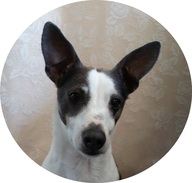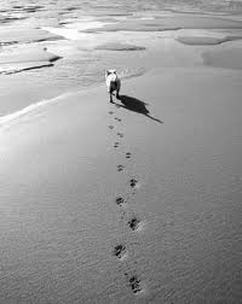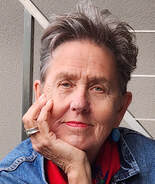My dog Pete is dead. The house feels empty. I feel sad.

Looking after him reminded me to look after myself - what made life good for him, shelter, food, warmth, security, company, exercise, rest, stimulation, purpose, made life good for me too. Pete’s unselfconscious enjoyment of the everyday taught me to relish the simple pleasures of life: a patch of sunlight; good food; a warm glance; a loving touch; a cool drink of water. Nothing very spectacular, but knitted together these moments make a life.

For a very few moments he was a slightly nervous, sick dog on a vet's table. Then a sedative made him a sleepy dog who leaned into me before he lay himself down. Jonathan, the vet, helped me cradle Pete’s weighty head in my hands, and then he injected the drug that would stop my dog’s heart. Pete twitched and made some snorting, gasping sounds, just as Jonathan had forewarned me that he might. His tongue lolled out of his mouth but his eyes did not close. Jonathan had warned me of this too.
As he had promised he would, Jonathan pressed his stethoscope into the fur on Pete’s chest to check that his heart had stopped. In a minute or two, he checked again: I need not be afraid that I would bury him while he was still alive.
Jonathan picked up Pete’s slumped, lifeless body and curled him in his basket on his old red blanket. This is why we invented religion, I thought. We need to explain this commonplace but utterly mysterious transition - a living thing becoming not-alive. In front of my eyes, a sensate creature of particular character and intelligence had vanished and been replaced by an inanimate but exact replica: a four-footed creature with grey and white fur and eyes that still shone, a still-wet nose, one velvety ear still cocked.
“Our bodies” remarked John Updike in one of his short stories “are the ponderous residue the spirit leaves behind”.
Jonathan tucked another of Pete’s favourite blankets around him and carried him, in his basket, through the waiting room, to the clinic’s car park. He placed Pete into the car in which my kind ex-husband would drive him to his farm for burial. Jonathan shook my ex-husband’s hand. Then he turned and hugged me - an act of farewell which was as touching as it was unexpected.
Pete was lucky to be healthy dog. Most of his vet visits were for routine matters or problems which did not need major or extended treatment although once, during a night-time walk in Victory Square he dashed into the road in pursuit of a cat and was hit by a motorbike. All I could see from the park was his body stretched out on the bitumen, lit by the twinned headlights of a van which had stopped to block oncoming traffic. My husband pushed me gently in the direction of home. “You go … you go” he said, “I'll take care of him”. When he came back to the house with Pete in his arms I could hardly bear to look at him, imagining blood-soaked fur and crushed bones.
Although it was after hours, we rang the Victory Square Vet Clinic. In a very short time a vet arrived, unlocked the clinic and examined Pete who, except for the print of a tyre tread over his muzzle, was completely unhurt. I was so wrecked with adrenaline and gratitude to the vet for coming so quickly, that I registered little about him except for his professional tenderness.
The vet who treated Pete that night was Jonathan Robinson, the same vet who helped Pete die so peacefully last month and who helped me to let him go.
Last Tuesday, Jonathan left Nelson to live in Wellington after twelve years ministering to animals at Victory. There will be many, like me, who will always be grateful for his frankness and his kindness, and how he helped us negotiate the difficult territory between medicine, ethics and compassion with a clear-eyed compassion for our pets - and for us.
We humans are complicated animals with clever, terrible minds which weigh and measure and compare. Our love for each other is often ambiguous, freighted with lifetimes of unresolved issues.
But there is no unfinished business when a loved animal dies. We know they have been totally themselves with us - quite unable to dissemble, withhold affection or bear grudges. We in return can be our best selves with them.
At its finest, life with a dog, is a stream of present moments.
This moment. This moment. This moment. And this ... last ... moment.
Good boy! Go!
 RSS Feed
RSS Feed

